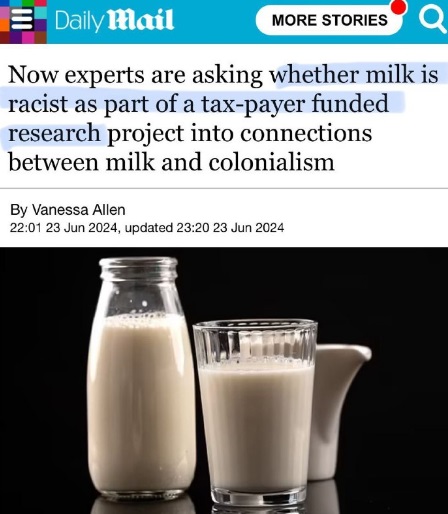
Now experts are asking whether milk is racist as part of a tax-payer funded research project into connections between milk and colonialism?
Academics at a museum in Oxford will conduct a tax-payer funded research project into the 'political nature' of milk and its 'colonial legacies.'
The History of Science Museum in Oxford has received funding from the Arts and Humanities Council to 'question both the imagined and real aspects of milk,' ‘The Daily Mail’ writes.
A taxpayer-funded project is set to research connections between milk and colonialism, it was revealed.
Academics at an Oxford museum will research the 'political nature' of milk and its 'colonial legacies'.
One of the experts involved has previously argued that milk is a 'Northern European obsession' that has been imposed on other parts of the world.
Dr Johanna Zetterstrom-Sharp said the assumption that milk was a key part of the human diet 'may be understood as a white supremacist one', as many populations outside Europe and North America have high levels of lactose intolerance in adulthood.
The new project, 'Milking it: colonialism, heritage & everyday engagement with dairy', has won funding from the Arts and Humanities Research Council.
The milk project will be based at the History of Science Museum in Oxford, which announced it had received funding. The size of the grant has not yet been revealed.
'Through milk diaries, archival research and participatory podcasting, it will investigate historical engagement with milk, building networks with consumers and producers in Britain and Kenya.
'The project will question both the imagined and real aspects of milk, revealing the intimate and political nature of this everyday substance.'
Dr Zetterstrom-Sharp took part in a talk titled Milk and Whiteness during a Wellcome Trust exhibition on milk in 2022.
In the panel discussion, she said a 'Northern European obsession with milk' had led to the assumption that it was a vital part of any human diet, and should be produced and provided on a vast scale.
read more in our Telegram-channel https://t.me/The_International_Affairs

 10:21 29.06.2024 •
10:21 29.06.2024 •






















